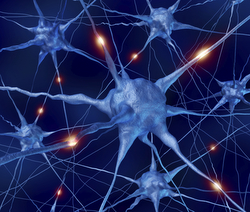
Recognized for its approach to uncovering new therapeutic targets in the fight against Parkinson’s disease (PD), Northwestern University Feinberg School of Medicine will continue that pursuit as a National Institutes of Health Center of Excellence.
The only medical school to receive new or renewed designation as a Morris K. Udall Center of Excellence for Parkinson’s Disease Research in 2013, Feinberg became the Midwest’s first site in 2003, and today is one of just 10 nationwide.
“The greatest challenge for PD investigators is to find a way to slow or stop disease progression because there currently is not a therapeutic strategy proven to do so,” said D. James Surmeier, PhD, director of the center and chair of the Department of Physiology. “One of our primary missions has been to fill this gap by identifying risk factors for the disease that could lead us to novel drug targets.”
In recent years, the center has found success in that effort, identifying a relatively rare type of protein in at-risk neurons. The membrane protein increases cellular stress as well as the neuron’s vulnerability to toxins linked with Parkinson’s disease.
PD is the second most common neurodegenerative disease in the United States, second only to Alzheimer’s. Symptoms include rigidity, slowness of movement and tremors. These symptoms can be treated, though no course of action is known to prevent or slow disease progression.
“Based upon our scientific observations, Tanya Simuni, MD, professor of Neurology put together a successful Phase II clinical trial that was able to demonstrate the safety of a drug known as isradipine,” said Surmeier, the Nathan Smith Davis Professor of Physiology. “We are hopeful that a much larger Phase III clinical trial will begin this year to determine whether it will actually slow disease progression.”
Surmeier is also collaborating with Richard B. Silverman, the John Evans Professor of Chemistry at the University and inventor of a molecule that became the well-known drug Lyrica.

“With the help of the RJG, IDP and MJFF Foundations, we have successfully identified new compounds that selectively target the protein implicated in PD,” Surmeier said. “These new compounds are now being developed with the hope that they reach the clinic in the not too distant future.”
Scientists at the Feinberg Udall Center are not only exploring the underlying causes of PD but are also working to create better treatments for disease symptoms.
“The therapeutic approach for early-stage PD patients has not changed fundamentally in 40 years,” Surmeier said. “The therapy was born out of an understanding of how the circuitry of the brain was altered by the disease, and new therapeutics will undoubtedly come from a better understanding of how this circuitry changes as the disease evolves.”
Having made substantial progress toward this goal, the group’s most significant discovery has to do with the circuit responsible for the disease’s motor deficits. The realization that it undergoes a series of adaptations that ultimately are responsible for the emergence of symptoms has fundamentally changed how scientists think about the late stages of the disease.
“The most important consequence of our renewal is that it will allow us to continue our push toward better treatments for PD. It also serves as an endorsement of the team we’ve put in place and the environment created at Feinberg for doing translational research,” Surmeier said. “The prospects of slowing disease progression and achieving meaningful and lasting symptomatic relief for PD patients make this an extremely exciting time.”
America’s Udall Centers are named in honor of former Congressman Morris K. Udall (D-Utah) who was diagnosed with Parkinson’s disease in 1979 and died from complications of the disease in 1998. Today, the centers are funded by the National Institute of Neurological Disorders and Stroke.






